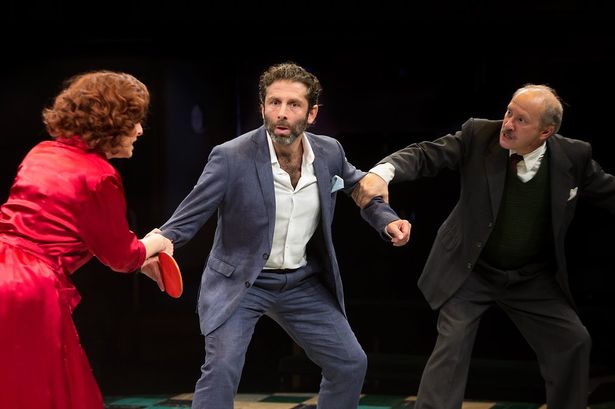A New York family’s bonds are tested as secrets spill and fortunes turn in two, one of a kind, Christmas gatherings…
The Merchant of Venice 1936 ★★★★
Review: Fiddler on the Roof ★★★★ - Raising the roof at Chichester Festival Theatre
 I am grateful to my Bubbe, who arrived in London from the Pale of Settlement in 1890, cradling the first of her 10 children, my beloved grandma. And equally to the paternal grandfather I sadly never met, who made his painful way to Britain from Bobruisk, Belarus, despite his gammy leg. Thanks to them my family thrived here rather than perishing in a pit in the Holocaust. But did they leave voluntarily, or were they pushed out like the Jews of Anatevka?
I am grateful to my Bubbe, who arrived in London from the Pale of Settlement in 1890, cradling the first of her 10 children, my beloved grandma. And equally to the paternal grandfather I sadly never met, who made his painful way to Britain from Bobruisk, Belarus, despite his gammy leg. Thanks to them my family thrived here rather than perishing in a pit in the Holocaust. But did they leave voluntarily, or were they pushed out like the Jews of Anatevka?
Daniel Evans’ beautifully thought-through production made me ponder this question more than any previous incarnation of this much-loved musical, based on Shalom Aleichem’s equally-loved tales. Gloriously funny though it may be when appropriate, it provokes thought as well as sentimental tears, starting with the eloquent opening, which actually has these Jews arriving to set up home in Anatevka from wherever else they have fled or been ejected.
Each carries some form of luggage – a metaphor for emotional baggage, somehow simultaneously obvious and subtle. For much of the evening designer Lez Brotherston offers little more set than these precious objects, both sentimental and practical, accompanying their owners to change each scene (the Sabbath table is extended to accommodate visiting student Perchik by adding a trunk covered with a tablecloth).
So as they dare to put down tentative roots in Anatevka, instead of the opening number Tradition bursting brashly onto the stage, its performers earn the right to share the significance of their traditions with their audience.
It makes the humour of Omid Djalili’s splendidly warm and rounded Tevye all the richer and more nuanced. Iranian-born Bahai Djalili is no stranger to playing Jews. On his CV are Fagin in Oliver! and a Muslim who discovers he was born Jewish in Infidel – you could now add he was born to play Tevye. He splendidly embodies the conflicted milkman torn between the security blanket of tradition and losing his daughters if he won’t face up to the changes their generation embraces. And he effortlessly laughs with his audience at himself and that dilemma, coining anew those catchphrases: “On the one hand… on the other hand…” and “As the Good Book says…” so you feel his God might laugh sympathetically too.
He’s well-matched by Tracy-Ann Oberman’s brisk, dry-humoured, long-suffering Golde, especially in their touching “Silver Wedding” duet Do You Love Me? (“after 25 years it’s nice to know!”).
The show’s elegant structure has each of his three oldest daughters push the boundaries a little further. Tzeitel gets her father onside so she can marry her poor Jewish tailor rather than wealthy widower, the butcher Lazar Wolf. Hodel and student revolutionary Perchik will marry without Tevye’s permission if necessary. And Chava must accept that she is dead to her father if she marries ‘out’ – her beloved Fyedka is a Gentile. All are strongly cast here. Simbi Akande’s Tzeitel is touchingly single-minded in her love for Jos Slovick’s doggedly determined Motel. Emma Kingston’s spiky Hodel vividly charts her awakening love and awareness of a world outside Anatevka, as she falls for Louis Maskell’s ardent, assertive Perchik. And Rose Shalloo’s vulnerable, bespectacled Chava is heartbreaking, pleading for acceptance of Luke Fetherston’s sensitive Fyedka.
Watching the “little unofficial demonstrations” that the local militia are ordered to carry out against their Jewish population, starting with the chilling disruption of the joy and emotion of Motel and Tzeitel’s wedding, you can understand Tevye’s tipping point.
Set pieces like the wedding and Tevye’s dream conjuring Grandma Tzeitel (Mia Soteriou) to speak for Motel and Lazar Wolf’s formidable late wife Fruma Sarah (Laura Tebbutt) to forbid her husband’s remarriage are imaginatively realised, the latter with stunning lighting (David Hersey) and fiery effects. And Alistair David’s choreography has Anatevka’s Jews hold themselves with an authentic upper-body erectness, proud and graceful, whether in a circle dance for both sexes or the famous men-only bottle dance.
So if you’ve ever sniffled your way through what you thought was a schmaltzy musical, this production earns real tears alongside the gales of laughter, above all as those battered bags come out again when Anatevka’s Jewish population receives its marching orders. Here are the parallels with today’s migrations. May tomorrow’s loyal citizens look back with love and admiration at the brave forebears who made perilous journeys to uncertain futures in the West.
By Judi Herman
Photos by Johan Persson
Fiddler on the Roof runs until Saturday 2 September. 7.30pm, 2.30pm (various Wed, Thu & Sat; phone to confirm). From £10. Chichester Festival Theatre, PO19 6AP. 012 4378 1312. www.cft.org.uk
Click here to listen to Emma Kingston, who plays Hodel, talking to Judi Herman on JR OutLoud.
Review: The Mighty Walzer ★★★★ – Howard Jacobson’s comedy of table tennis and Jewish teenage angst in 1950s Manchester comes home in triumph
 From the moment Elliot Levey ‘s Oliver Walzer bounds on stage and takes in the 360 degrees of audience seated around him, the warmth and inclusivity of Jonathan Humphreys’ perfectly-cast production works its magic, taking its audience back to 1950s Jewish Manchester, conjuring it up with what seems like just a few props and sound effects.
From the moment Elliot Levey ‘s Oliver Walzer bounds on stage and takes in the 360 degrees of audience seated around him, the warmth and inclusivity of Jonathan Humphreys’ perfectly-cast production works its magic, taking its audience back to 1950s Jewish Manchester, conjuring it up with what seems like just a few props and sound effects.
Simon Bent’s adaptation is extraordinarily faithful to the spirit and narrative of Howard Jacobson’s now classic comic novel of teenage angst and table tennis. He has a lovely knack of putting the right words into the right mouths to bring to life incidents described by the narrator in the novel. The comic tale of Oliver’s larger-than-life father Joel’s own attempt at competitive ‘sport’, entering the World Yo-yo Championship armed with his homemade, ridiculously outsized yoyo, makes for a delicious opening narrative, shared by Oliver and his parents, batting retorts to each other like a game of verbal ping pong. Jonathan Tafler’s ebullient Joel and Tracy-Ann Oberman’s beautiful portrait of warm and worried Sadie, staying just the right side of classic Jewish mother, work wonderfully together as a sort of marital double act – can’t live together, can’t live apart. And Bent has come up with a wonderfully theatrical device for Oliver’s houseful of aunties. Not only are they reduced to just two, but both are played by the same great character actor, Ann Marcuson. She has a lot of fun as strangely identical love rivals Dolly and Dora, who of course are never seen onstage together …
Levey’s Oliver is also a 180 degree rounded creation. Bearded so that he recalls his creator Jacobson as gently as he recalls his youth, he engages with his eccentric family and all the denizens of his past, entering his own youth with all the hindsight of middle age, and the crisis he is negotiating, and brokering the deal between audience and action.
Oliver is backed up by a wonderfully eccentric gang of nerds, the ping pong posse into whose ranks he breaks so spectacularly during one memorable day at the local Jewish social club. The actors deftly create these individual young men but at the same time subsume their personalities as necessary to create the gang of nerds Oliver joins. So let’s hear it for Ilan Goodman aka Aishky, James Parris’s Twink, Joe Coen’s Sheeny Waxman and Daniel Abelson (niftily doubling as Uncle Motty and RoyBoy a (non Jewish) rival at the ping pong table) – and not forgetting David Grellin as destructive eminence grise, veteran player and serial Auntie seducer Gershom Finkel.
They are all totally convincing as driven, obsessive, competitive - and highly skilled - table tennis players. The game itself is brilliantly realised by bats on thin threads descending from the flies to be grasped and wielded by eager and expert hands. The balls themselves are simply sound effects – made, in a brilliant coup de theatre, by cast members breathing through microphones. Ben and Max Ringham are responsible for this and all the other highly effective soundscapes.
James Cotterill’s set goes for that very best of strategies for theatre in the round – selective realism, with judicious use of props and effectively enhanced by Lizzie Powell’s lighting. So audience attention focuses for example on the high cistern lavatory, the teenage Oliver’s refuge where he pores over his soft porn mags, keeping his infuriated father safely on the outside.
Perhaps the most spectacular focus is the van off the back of which Dad Joel sells his ‘swag’ – the rubbish souvenirs and novelties, cheap toys and trinkets with which he hopes to make his fortune. It’s wonderfully detailed – full of enticing stuff and brilliantly lit - a great background to the rollicking sales pitch of Joel and his acolyte Sheeny Waxman (Coen really relishes channelling Waxman’s gift of the gab here). And then – lights, camera, action – it’s replaced by a glowing, spectacularly-lit catwalk down which Lorna Peachley, the frighteningly desirable shiksa (non-Jewish girl) after whom Oliver lusts, sashays with her tennis racket – a perfectly pitched performance from blonde (and actually Jewish!) Mancunian Lily Sarcofsky!
But when it’s actually necessary to fill the stage – for example with cardboard boxes towards the end when the family is faced with having to pack up and move away, it all happens with consummate smoothness. For Bent wisely takes his action only as far as Oliver’s offer of a place at Cambridge, leaving the audience in the warm bubble of 1950s Manchester he and the company have so perfectly created to share with their audience.
It’s a marvellously detailed portrait of the life, loves, lusts and complexes of a Jewish teenage boy, perfectly evoking a particular time and place and bringing it to life, but actually subtly nuanced just because it’s seen through the lens of experience. And it’s warmly inclusive too – just enough Yiddishisms to get the feel right but always accessible from the context – you don’t have to be Jewish! Bent and Humphreys have done Jacobson and Jewish Manchester proud and they can kvell (Yiddish: express pride) over a job well done.
By Judi Herman
The Mighty Walzer runs until Saturday 30 July, 7.30pm & 2.30pm, £8-£16, at Royal Exchange Theatre, Manchester, M2 7DH. www.royalexchange.co.uk
Howard Jacobson and Sherry Ashworth appear in conversation on Monday 11 July, 7pm, £5, at Royal Exchange Theatre.
The Mighty Walzer Walking Tour runs Sunday 17 – Thursday 28 July, 10.30am, £7, at Manchester Jewish Museum, M8 8LW; 084 3208 0500. www.manchesterjewishmuseum.com
Chess in Shorts, an exhibition by Howard Jacobson and Manchester Jewish Museum, runs until Saturday 30 July, FREE, at the Royal Exchange Theatre.
Read our interview with The Mighty Walzer's playwright and actor, Simon Bent and Elliot Levey as well as hearing our podcast with table tennis champion Jeff Ingber.





